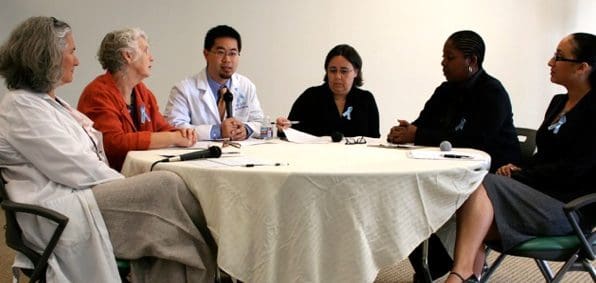
Local clinic doctors gather to plead for health care reform

La Clinica de la Raza, a block away from Oakland’s Fruitvale Bart Station, was bustling with people this morning. An elderly man walked into the dental clinic near the lobby’s front door, and a man and woman with a small child conversed in Spanish as they headed toward the second floor where Women and Family Medicine, Pediatrics, and Patient Accounts was located.
On the third floor, more than forty people gathered in a conference room to listen to physicians from La Clinica, Asian Health Services from Oakland’s Chinatown, and LifeLong Medical Care from Berkeley, talk about the need for health care reform.
“Our job is to let people know how they’ll be impacted,” said California Primary Care Association Senior Policy Analyst Tahira Bazile. who co-moderated the roundtable with Peggy Moore, political director of Organizing for America, the Obama Administration’s grass-roots campaign organization. “There’s a lot of education we need to do,” Bazile said.
According to the representatives from La Clinica and CPCA, California’s community clinics and health centers have lost over $100 million due to the state’s budget. Because of this, clinics may be forced to eliminate Medi-Cal–which means an end to services including dental care for adults, audiology, and optometry; and primary care for seasonal agricultural migratory workers, rural health services, and Native American health.
Recently, the demand for the Oakland-based La Clinica’s services has increased dramatically, due to the rise in unemployment and consequently, the loss of health insurance benefits. The clinic’s waiting list has gone from 300 to 700 people in the last month alone.
La Clinica de la Raza’s Dental Director Ariane Terlet gave an example of the impact a lack of health insurance can have on patients who delay their dental care.
“If you get an infection in your upper jaw, the infection goes into your tooth,” Terlet said. “If it doesn’t get taken care of early, that infection goes straight into your sinus, and then into your brain.” She said that a sinus infection can be healed if treated early, but that if it reaches the brain, it can be fatal.
Among the physicians, health care workers, and community members at the roundtable, a particular concern was the rise in health-care costs that have led patients to delay seeking medical attention, or to opt out of buying health insurance in spite of the risks.
“31% of Koreans don’t have health insurance in the U.S.” said Asian Health Services physician Ricky Choi, who sat on the panel. “Included in that group is my uncle and aunt,” Choi said. “They made a choice to pay for college for their daughter, rather than health insurance. So they’re making a gamble on their life.”
Choi said many of his patients are in vulnerable places in life, having lost their jobs and health insurance in recent months. Choi has worked at the Asian American Health Center for the past two years, and said in an interview after the roundtable discussion that his patients are primarily low-income people who don’t speak English.
“Now the annual (health insurance) cost for a family is over $13,000,” Choi said during the panel. “And it’s increasing at a rate greater than their wages.”
